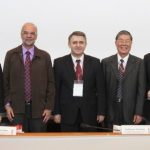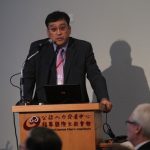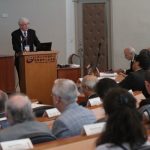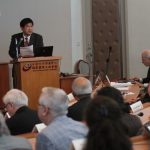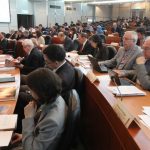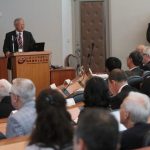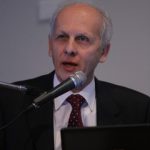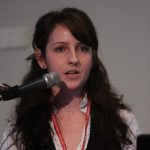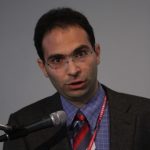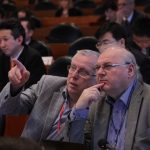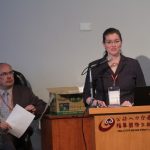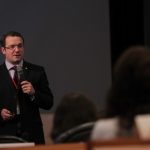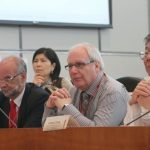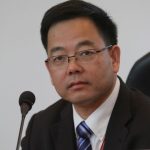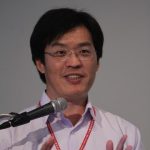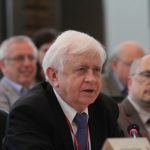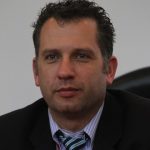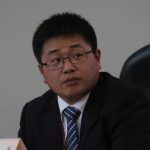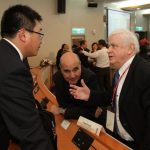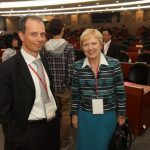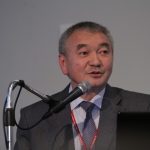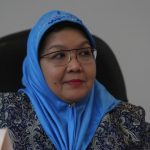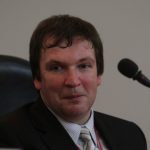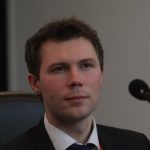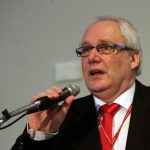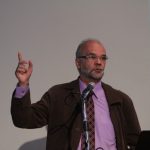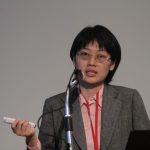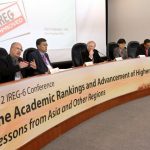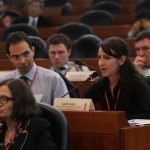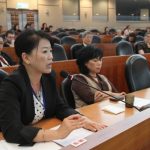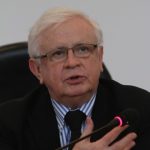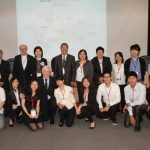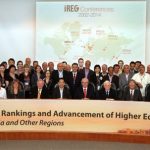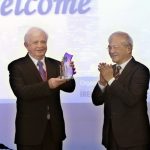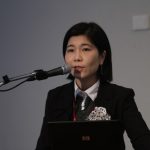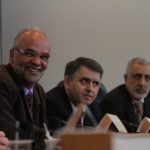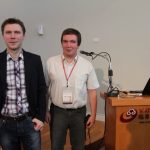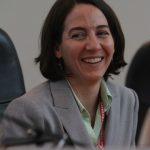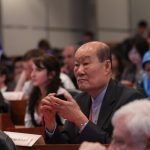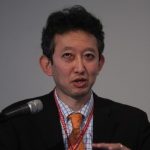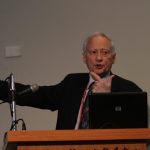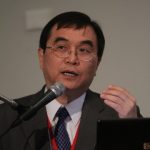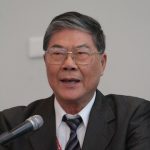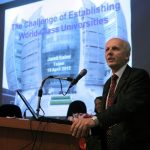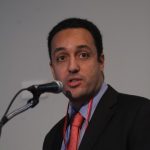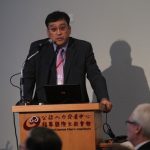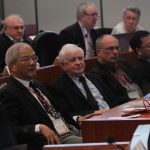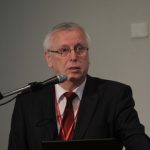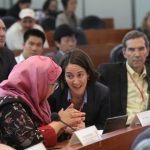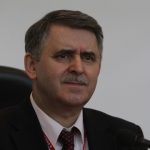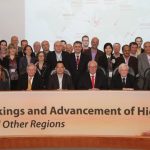
IREG-6 - Post conference note
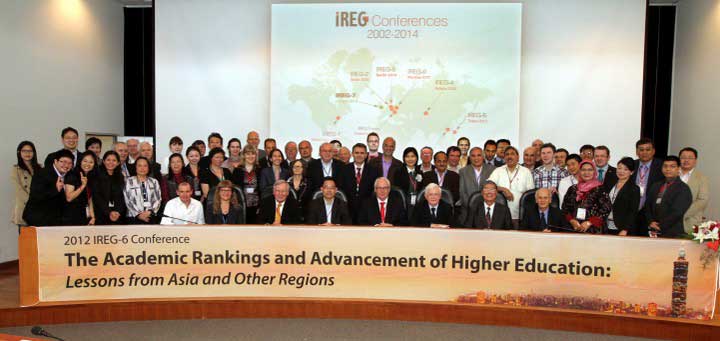
(Taipei, 20 April 2012) IREG-6 Conference, the premier international event of the year focused on issues of rankings and academic excellence in higher education, took place in Taipei on 18-20 April 2012. Organized by the IREG Observatory on Academic Ranking and Excellence and the Higher Education Evaluation & Accreditation Council of Taiwan (HEEACT), the conference drew together some 150 delegates from across the globe to consider myriad aspects of the event’s central theme, “Academic Rankings and Advancement of Higher Education. Lessons from Asia and other Regions”.
The scene was set by Jamil Salmi, a global education expert and former Tertiary Education Coordinator for the World Bank. He provided insight into a model for the making of world-class institutions, which relies heavily on three core “ingredients”: the acquisition (and retention) of top academic talent, formidable (and sustained) levels of funding, and a governance favorable to building and maintaining dynamic and innovative institutions of the highest academic quality.
Eight in-depth thematic sessions provided participants with an opportunity to discuss and debate everything from the newest initiatives and developments in the world of academic rankings, to methodological challenges and suggested improvements for the sector, institutional responses toward academic rankings, and their uses by some governments.
The issues of quality of higher education, and in particular “mutual reinforcement” between ranking and quality assurance efforts and accreditation exercise sat at the heart of much of the IREG-6 discourse. Several speakers pointed out that rankings, in many instances provide managers and government officials a clearer and more telling picture of the quality of higher education and its institutions than that revealed by the accreditation processes. Rankings also serve as a benchmark and stimulus towards forcing institutions to strive achieve higher quality. Presenters noted that rankings can serve as extremely useful guides for self-awareness and strategic action at the institutional and national level.
Due attention was given throughout the conference to the issues rankers themselves face, particularly in terms of methodological challenges, stakeholder inclusiveness, and transparency. For example, the extent to which student voices and perspectives are presented (or not) in university rankings at national and international levels was raised as a specific concern. Moreover, although progress appears to be ongoing, educating the public about the ways in which rankings can assist “end users” more broadly is another area where greater success could be realized.
New and innovative approaches to rankings were also explored, including the evolving interest in new focus areas, such as academic fields and subjects, regions, cities, and campus sustainability. And while cautionary voices were raised about the tendency to define academic “excellence” in ways that do not sufficiently value non-research activities, several presenters introduced cutting-edge products from the commercial sector that are specifically designed to assist institutions in mapping their research output and potential in ever more sophisticated ways.
The conference provided delegates with a diverse range of perspectives on rankings and quality in higher education. As natural for an event taking place in Taipei the largest group of speakers came from Asia including Nian Cai Liu (Shanghai Jiao Tong University, China), Riti Fitri Sari (University of Indonesia) and Angela Yung-chi Hou (HEEACT, Taiwan). Among speakers from Europe were: Andrejs Rauhvargers, (European University Association), Gero Federkeil (CHE, Germany) and Waldemar Siwinski (Perspektywy, Poland). A view on the rankings from Brazil’s perspective was presented by Luiz Claudio Costa, (National Institute of Studies and Educational Research), while Middle East was represented by Sadiq Sait Mohammed (King Fahd University of Petroleum & Minerals, Saudi Arabia). Canadian approach to ranking was presented by Roland Proulx (University of Montreal). The IREG-6 Conference was chaired by Jan Sadlak, President of IREG Observatory.
Following the conference, the IREG Observatory’s General Assembly admitted six new members: Aalborg University (Denmark), People’s Friendship University of Russia, University of Indonesia, St. Petersburg University (Russia), University of Navarra (Spain), and Wuhan Golden Apple Scientific Education Agency (China). IREG Observatory has now a total of 28 member organizations from Europe, Asia and North America.
The conference in Taipei was the 6th gathering of experts on academic rankings. Previous IREG meetings took place in Warsaw in 2002 (IREG-0), Washington in 2004 (IREG-1), Berlin in 2006 and 2010 (IREG-2 and IREG-5), Shanghai in 2007 (IREG-3), and Astana in 2009 (IREG-4). The next IREG-7 Conference will be held in London in May 2014.
More information: www.ireg-observatory.org
Contact: secretariat@ireg-observatory.org
Invitation
IREG-6 Conference:
Academic Rankings and Advancement of Higher Education
Lessons from Asia and other Regions
Background and context
IREG-6 Conference will be an important venue for representatives of the ranking organizations, experts on quality assurance and academic excellence as well as stakeholders and interested parties to meet and discuss various topics concerning the academic rankings and other type of assessment of performance of higher education institutions.
On previous occasions, IREG conferences met in Warsaw, Washington, Berlin, Shanghai, Astana, and again in Berlin, demonstrating a growing interest and relevance of a relatively new phenomenon which is academic rankings. As already indicated by title of the meeting, without neglecting relevant developments in other regions, the IREG-6 conference will concentrate on higher education in Asia Region. This region made tremendous progress in expanding access to higher education and as observes, Richard C. Levin, President of Yale University:
“The leading countries of Asia are focused on an even more challenging goal: building universities that can compete with the finest in the world. The governments of China, India, Singapore and South Korea are explicitly seeking to elevate some of their universities to this exalted status because they recognise the important role that university-based scientific research has played in driving economic growth in the United States, Europe and Japan.”
It is also a region in which university rankings found acceptance and became important for governments, universities, students and other stake holders. The reason seems to be that rankings, with all due limitations, are perceived as “mirror” of their performance. Like in other parts of the world, Asian countries hope that a funding concentration policy will lead to creation of several top ranked institutions. In fact, there has been continuous debate over the direct and indirect effects of these policies. Reflection of these discussions will surely resonate during this meeting.
Like the previous meetings, IREG-6 will discuss new developments in university rankings with a special attention to their reliability and quality enhancement. In April 2011, IREG Observatory on Ranking and Excellence has adopted the rules and procedures that will be used in assessing the quality of rankings. The purpose of an audit, conducted by independent academic teams, will be to verify if a ranking under review was done professionally, and observes good practices, providing students, their parents and employers with information allowing them to compare and assess programs offered by higher education institutions (more information can be accessed at www.ireg-observatory.org). At present, the audit process is ongoing, but it starts to have an impact on the development of existing ranking systems, and successfully drive rankers to make a self-examination according to these principles.
This two-day conference, will provide the participants not only a good insight into recent developments in academic rankings but will give an opportunity to interact directly with rankers of leading international and national rankings, researchers, university leaders, policy makers and other stake-holders from various regions to discuss major developments related directly and indirectly to higher education. Those who are interested are invited to take part in the event and are advised to register early due to the limited availability.
Last but not least, IREG-6 Conference and post conference (optional) programs will provide a great opportunity to experience the beauty, dynamism, history, exquisite cuisine and hospitality of Taiwan and its people.
Organizers
Program Committee
- Jan Sadlak, President of IREG Observatory on Academic Ranking and Excellence, Chair
- George J. Jiang, President, Higher Education Evaluation & Accreditation Council of Taiwan
- Gero Federkeil, Vice-President of IREG Observatory; CHE-Center for Higher Education, Germany
- Liu Nian Cai, Vice-President of IREG Observatory; Director, Center for World-Class Universities, Shanghai Jiao Tong University, P.R. China
- Waldemar Siwiński, Vice-President of IREG Observatory; Perspektywy Education Foundation, Poland
- Klaus Hüfner, Coordinator of IREG Ranking Audit; Professor Emeritus, Free University of Berlin, Germany
- Ching-Shan Wu, President, National Academy for Educational Research, Taiwan
- Angela Yung Chi Hou, Dean, Office of Research & Development, Higher Education Evaluation & Accreditation Council of Taiwan
Organizing Committee
- Angela Yung Chi Hou, Dean, Office of Research & Development, Higher Education Evaluation & Accreditation Council of Taiwan, Chair
- Kazimierz Bilanow, Managing Director, IREG Observatory on Academic Ranking and Excellence
- Bo-Jin Wang, Dean, Office of Evaluation Affairs, Higher Education Evaluation & Accreditation Council of Taiwan
- Ru-Jr Wang, Vice President of Academic Affairs, National Academy for Educational Research; Professor, National Taiwan Normal UniversityEllen Ya-Lun Tsao, Higher Education Evaluation & Accreditation Council of Taiwan
- Jackson Chun-Chi Chih, Director of Evaluation Research, Higher Education Evaluation & Accreditation Council of Taiwan
- Karen Hui-Jung Chen, research fellow, HEEACT
Programme
IREG-6 Conference:
The Academic Rankings and Advancement of Higher Education
– Lessons from Asia and Other Regions
Organized by:
IREG Observatory on Academic Ranking and Excellence
Higher Education Evaluation & Accreditation Council of Taiwan in collaboration with/support of:
Ministry of Education, Taiwan
National Academy for Educational Research, Taiwan
Taipei, 18-20 April, 2012
Conference venue: Howard International House, Taipei
Wednesday, 18 April 2012
Whole day Arrival of participants
14:30 – 18:00 Meeting of Executive Committee of IREG Observatory (closed session)
Venue: Room 901, Taipei Branch, National Academy for Educational Research
Address: 9 Floor, No.179, Sec. 1, Heping East Road, Taipei City 106, Taiwan
18:30 – 20:30 Welcome Reception
Venue: B1 Dining Room, Howard International House Address: B1, No. 30, Sec. 3, Xin-Sheng South Road, Taipei, Taiwan
Pre-conference workshop:
Using Data in Research Excellence and Institutional Strategic Plan
Venue: Conference Hall, Taipei Branch, National Academy for Educational Research
(Address: 10 Floor, No.179, Sec. 1, Heping East Road, Taipei City 106, Taiwan)
9:30 – 9:40 Welcome and Introduction
Chair: George Jiang, President of Higher Education Evaluation & Accreditaion Council of Taiwan. (HEEACT)
9:40 – 10:30
First Morning Session: Compare the Research Database and good Use to Enhance Institutional Strenght in Research.
Ming-Yueh Tsay, Professor, Graduate Institute of Library, National Chengchi University, Taiwan
10:30 – 11:00 Coffee break
11:00 – 12:00
Second Morning Session: Supporting the Research Lifecycle – How Data and Tools Can Improve Discovery, Collaboration and Evaluation.
Janet Chiew, SciVal Consultant, APAC, ElsevierVirginia Chiu, Product Sales Manager, Taiwan, Elsevier
12:00 – 13:20 Lunch
13:20 – 14:20
Afternoon session: Methods and Examples of Applying Data to Different Levels’ Research Excellence
Nobuko Miyairi, Principal Consultant, Thomson Reuters
Chang Han-wen, Information Analyst
14:20-15:20
Group Discussion: Research Database Case Study and Practice
The participants will be divided into three groups presenting different views: national level, regional level, and institutional level.
15:20-15:50
Group Reporting: Shanring Your Case Study and Practice Outcomes
Group reporting to be followed by questions and comments.
15:50-16:20
Concluding Session: What Have We Learned: Challenges and Future Directions
Jamil Salmi, Global Tertiary Education Expert, former World Bank Tertiary Education Coordinator
Thursday, 19 April 2012
Venue: International Conference Hall, Howard International House, Address: 1 Floor, No. 30, Sec. 3, Xin-Sheng South Road, Taipei, Taiwan
8:00 – 9:00 Registration
9:00 – 9:30
Opening Session
Chair: Jan Sadlak, President of IREG Observatory Welcome from: Wei-Ling , Minister Chiang, Ministry of Education Jei-Cheng Cheng, Chairman of Board, Higher Education Evaluation & Accreditation Council of Taiwan (HEEACT) Ching-Shan Wu, President of National Academy for Educational Research |
9:30 – 11:00
First Session: Rise of Higher Education in Asia: Competition and Cooperation
| Chair: George Jiang, President of Higher Education Evaluation & Accreditation Council of Taiwan (HEEACT) Keynote address: Jamil Salmi, Global Tertiary Education Expert, former World Bank Tertiary Education Coordinator Comments from: |
11:00 – 11:30 Coffee break
11:30 – 12:30
Second Session: New Initiatives and Developments in Academic Rankings
Chair: Liu Nian Cai, Vice-President of IREG-Observatory; Dean of the Graduate School of Education, Shanghai Jiao Tong University, Shanghai, China Judit Fodor, Eötvös Lorand University, Budapest, Hungary Ben Sowter, Head of Division, QS Intelligence Unit, London, United Kingdom |
12:30 – 13:30 Lunch
13:30 – 15:00 Third Session: Experience in Academic Rankings Development in Asia
Chair: Thomas D. Parker, Senior Associate, Institute for Higher Education Policy (IHEP), Washington D.C., USA Sheng-Ju Chan, Graduate Institute of Education, National Chung Cheng University, Taiwan Zia Batool, Director General-Quality Assurance and Statistics, Higher Education Commission Pakistan, Islamabad, Pakistan The Academic Ranking and Advancement of Higher Education: A Pakistani Experience Akiyoshi Yonezawa, Graduate School of International Development, Nagoya University, Japan Rankings and Information on Japanese Universities Juan Wen Cai and Ying Cheng, Center for World-Class Universities, Graduate School of Education, Shanghai Jiao Tong University, China Ranking of Top Universities in Greater China Weijun Wang, Professor, Research Center for China Science Evaluation, Wuhan University, Wuhan, China 2011 Multi-indicator Analysis of Competitiveness of World-class Universities and Research Institutions |
15:00 – 16:15 Fourth Session: Methodological Challenges for Academic Rankings
Chair: John Molony, Vice-President for Strategic Planning & Marketing, QS Quacquarelli Symonds, London, United Kingdom Proulx Roland, University of Montreal, Canada |
16:00 – 16:30 Coffee break
16:30 – 17:30 Fifth Session: Institutional Responses towards Academic Rankings
Chair: Ghislaine Filliatreau, Director of OST – Observatoire des Sciences et des Techniques, Paris, France Institutional case studies from: Hwung-Hweng Hwung, President, of National Cheng Kung University, Taiwan |
17:30 – 18:30 Six Session: The Impact of Academic Rankings: Institutional and Governmental Perspectives
Chair: Ru-Jr Wang, Vice-President of Academic Affairs, National Academy for Educational Research, Taiwan Sergiy Kurbatov and Andriy KashynUniversity Ranking as Innovative Educational Technology: Case of Ukraine Nello Angerilli, PVC Student Services and International, University of Canterbury, Christchurch, New Zealand, and Daniel J. Guhr, Managing Director, The Illuminate Consulting Group, San Carlos, CA, USA Aida Sagintayeva and Kairat Kurakbayev, Centre for Educational Policy, Nazarbayev University, Astana, Kazakhstan The Impact of Academic Rankings on Governmental Policy in Kazakhstan: Challenges and Prospects |
19:30 – 21:30 Conference Gala Diner and Taiwanese cultural performances
Location: The Howard Plaza Hotel, Taipei
Friday, 20 April 2012
9:00 – 10:30 Seventh Session: Quality and Rankings in Higher Education: Mutual Reinforcement -Keynote speech and Panel Discussion
| Chair: Waldemar Siwiński, Vice-President of IREG-Observatory; President of Perspektywy Education Foundation, Poland Keynote speech: Global University Rankings: More Diverse and More Transparent but Old Flaws are Alive Andrejs Rauhvargers, Professor, Senior Advisor, EUA – European University Association, Brussels |
Panel:
- Luiz Claudio Costa, President of the National Institute of Studies and Educational Research Ansio Teixeira, Brazil
- Sadiq Sait Mohammed, Director of Information Technology, King Fahd University of Petroleum & Minerals, Saudi Arabia
- Jagannath Patil, Asia-Pacific Quality Network (APQN); National Assessment and Accreditation Council, Bangalore, India
- Angela Yung-chi Hou, Dean of Office of Research & Development, Higher Education
Evaluation and Accreditation Council of Taiwan (HEEACT), Taipei, Taiwan; Fu Jen Catholic University
10:30 – 11:00 Coffee break
11:00 – 13:00 Eight Session: Improving Rankings – Responsibility and Challenges
Chair: Klaus Hüfner, IREG Audit Coordinator; Professor Emeritus, Free University of Berlin, Germany Chang Han-wen, Information Analyst , Thomson Reuters |
13:00 – 14:00 Final Session: Presentations, Discussion and Closing of the Conference
Chair: Jan Sadlak, President of IREG Observatory
Presentations from Elsevier and Thomson Reuters (subject to confirmation) |
Afternoon:
Optional tourist program: Sightseeing and Cultural Events (Hot Spring Tour/ Night Market Tour/ Northern Coast Tour)
14:15 – 16:15 General Assembly of IREG Observatory (closed session)
Venue: International Conference Hall, Howard International House, Address: No. 30, Sec. 3, Xin-Sheng South Road, Taipei, Taiwan
16:15 – 16:30 Coffee break
16:30 – 18:30 Meeting of the Executive Committee of IREG Observatory (closed session followed by dinner at 19:00)
Saturday, 21 April 2012
Whole day: Optional tourist program and departure of participants
Documents
2012 IREG-6 Conference 1st Session – Rise of Higher Education in Asia : Competiton and Cooperation by Dr. Jamil Salmi
2012 IREG-6 Conference 2nd Session – New Initiatives and Developments in Academic Rankings
2012 IREG-6 Conference 3rd Session – Experience in Adacemic Rankings : Developments in Asia
2012 IREG-6 Conference 4th Session – Methodological Challenges for Academic Rankings
2012 IREG-6 Conference 4th Session – Methodological Challenges for Academic Rankings
2012 IREG-6 Conference 6th Session – The Impact of Academic Rankings : Institutional and Governmental Perspectives
2012 IREG-6 Conference 7th Session – Quality and Rankings in Higher Education : Mutual Reinforcement
2012 IREG-6 Conference 8th Session – Improving Rankings – Responsibility and Challenges
Photo Gallery
